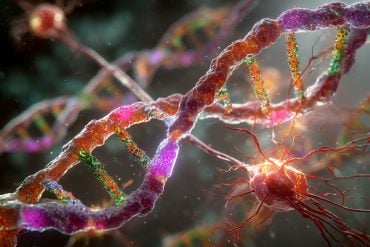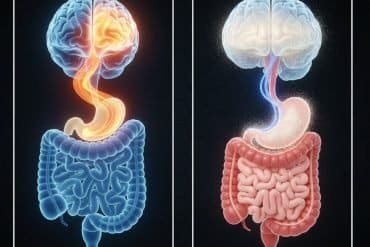Summary: A new study reports low protein high carb diets show promise in improving brain health, as well as learning and memory.
Source: University of Sydney.
Low-protein high-carbohydrate diets may be the key to longevity, and healthy brain ageing in particular, according to a new mice study from the University of Sydney.
Published today in Cell Reports, the research from the University’s Charles Perkins Centre shows improvements in overall health and brain health, as well as learning and memory in mice that were fed an unrestricted low protein high carbohydrate diet.
“There are currently no effective pharmaceutical treatments for dementia – we can slow these diseases, but we can’t stop them – so it’s exciting that we are starting to identify diets that are impacting how the brain ages,” said lead author and PhD candidate Devin Wahl.
The research shows for the first time that unrestricted low-protein, high-carbohydrate diets have similar protective benefits for the brain as calorie restriction, which is well known for its longevity benefits although not sustainable in humans.
“We have close to 100 years of quality research extolling the benefits of calorie restriction as the most powerful diet to improve brain health and delay the onset of neurodegenerative disease in rodents,” said Mr Wahl.
“However, the majority of people have a hard time restricting calories, especially in Western societies where food is so freely available.
“It shows a lot of promise that we have been able to replicate the same kind of gene changes in the part of the brain responsible for memory that we also see when we severely restrict calories,” said Mr Wahl.
Low-protein high-carbohydrate diets are by no means a new fad.
Senior author Professor David Le Couteur said numerous cultures including the people of Okinawa in Japan and many parts of the Mediterranean have long observed this mix. “The traditional diet of Okinawa is around nine percent protein, which is similar to our study, with sources including lean fish, soy and plants, with very little beef. Interestingly, one of their main sources of carbohydrate is sweet potato,” said Professor Couteur, Professor of Geriatric Medicine at the University of Sydney.
For the current study, researchers fed the mice complex carbohydrates derived from starch, and casein protein which is found in cheese and milk.
To assess the brain benefits of the diet the researchers focused on the hippocampus, the region of the brain responsible for learning and memory.

“The hippocampus is usually the first part of the brain to deteriorate with neurodegenerative diseases like Alzheimer’s. However, the low-protein high-carbohydrate diet appeared to promote hippocampus health and biology in the mice, on some measures to an even greater degree than those on the low-calorie diet,” said Professor Couteur.
Learning and memory was assessed via a series of spatial awareness and memory tests, with researchers noting modest improvements in male and female mice at both young and old ages.
This research follows a landmark 2015 study from the University of Sydney’s Charles Perkins Centre that showed low protein, high carbohydrate diets could be just as effective as low calorie diets in promoting a long life in mice through good heart and digestive health.
Funding: National Health and Medical Research Council project grant, Ageing and Alzheimers Association, the McKnight Bequest, Sydney Medical School Foundation, American Australian Association funded this study.
Source: Michelle Blowes – University of Sydney
Publisher: Organized by NeuroscienceNews.com.
Image Source: NeuroscienceNews.com image is in the public domain.
Original Research: Open access research for “Comparing the Effects of Low-Protein and High-Carbohydrate Diets and Caloric Restriction on Brain Aging in Mice” by Devin Wahl
Samantha M. Solon-Biet, Qiao-Ping Wang, Jibran A. Wali, Tamara Pulpitel, Ximonie Clark, David Raubenheimer, Alistair M. Senior, David A. Sinclair, Gregory J. Cooney, Rafael de Cabo, Victoria C. Cogger, Stephen J. Simpson, and David G. Le Couteur in Cell Reports. Published November 20 2018.
doi:10.1016/j.celrep.2018.10.070
[cbtabs][cbtab title=”MLA”]University of Sydney”Low Protein High Carb Diets Show Promise for Healthy Brain Aging.” NeuroscienceNews. NeuroscienceNews, 20 November 2018.
<https://neurosciencenews.com/diet-brain-aging-10237/>.[/cbtab][cbtab title=”APA”]University of Sydney(2018, November 20). Low Protein High Carb Diets Show Promise for Healthy Brain Aging. NeuroscienceNews. Retrieved November 20, 2018 from https://neurosciencenews.com/diet-brain-aging-10237/[/cbtab][cbtab title=”Chicago”]University of Sydney”Low Protein High Carb Diets Show Promise for Healthy Brain Aging.” https://neurosciencenews.com/diet-brain-aging-10237/ (accessed November 20, 2018).[/cbtab][/cbtabs]
Abstract
Comparing the Effects of Low-Protein and High-Carbohydrate Diets and Caloric Restriction on Brain Aging in Mice
Calorie restriction (CR) increases lifespan and improves brain health in mice. Ad libitum low-protein, high-carbohydrate (LPHC) diets also extend lifespan, but it is not known whether they are beneficial for brain health. We compared hippocampus biology and memory in mice subjected to 20% CR or provided ad libitum access to one of three LPHC diets or to a control diet. Patterns of RNA expression in the hippocampus of 15-month-old mice were similar between mice fed CR and LPHC diets when we looked at genes associated with longevity, cytokines, and dendrite morphogenesis. Nutrient-sensing proteins, including SIRT1, mTOR, and PGC1α, were also influenced by diet; however, the effects varied by sex. CR and LPHC diets were associated with increased dendritic spines in dentate gyrus neurons. Mice fed CR and LPHC diets had modest improvements in the Barnes maze and novel object recognition. LPHC diets recapitulate some of the benefits of CR on brain aging.







